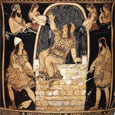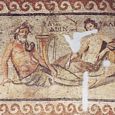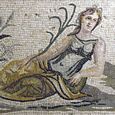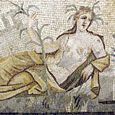OKEANIDES
Greek Name
Ωκεανις Ωκεανιδες
Transliteration
Ôkeanis, Ôkeanides
English Spelling
Oceanid, Oceanids
Translation
Daughters of Oceanus
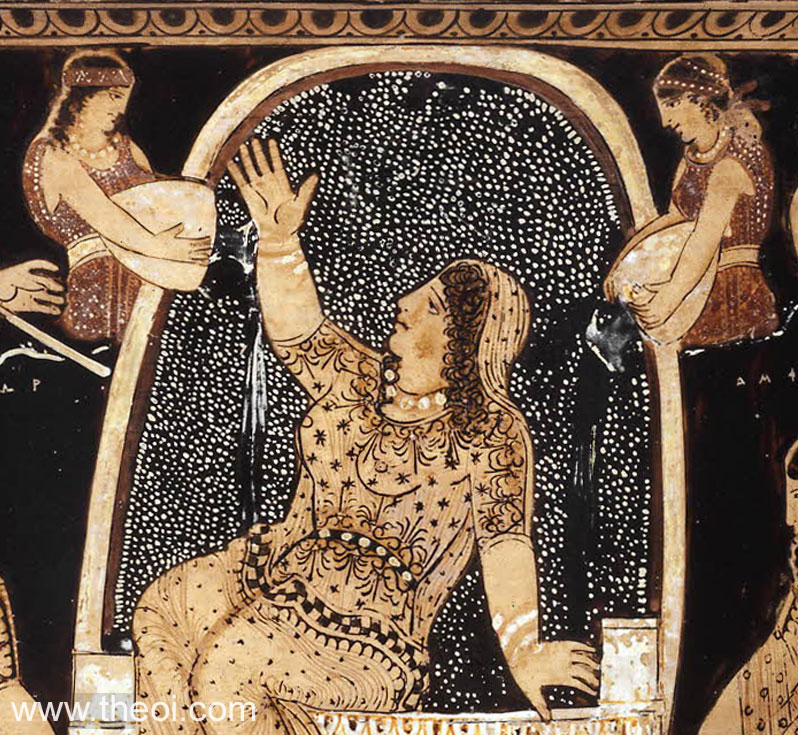
THE OKEANIDES (Oceanids) were three thousand goddess-nymphs who presided over the sources of earth's fresh-water--from rain-clouds to subterranean springs and fountains. Their numbers included the Nephelai (Cloud-Nymphs), Aurai (Breeze-Nymphs), Naiades (Spring and Fountain Nymphs), Leimonides (Pasture Nymphs), and Anthousai (Flower Nymphs). They were all daughters of the great, earth-encircling, fresh-water stream Okeanos (Oceanus) and his wife Tethys.
The eldest among them were numbered among the Titanides (female Titans)--Styx, Dione, Neda, Metis, Klymene, Eurynome, Doris, Elektra, and Pleione. These were most likely heavenly goddesses of the clouds.
Some of the Okeanides personified divine blessings such as Metis (Wisdom), Klymene (Fame), Plouto (Wealth),
Tykhe (Good Fortune), Telesto (Success), and Peitho (Persuasion). The goddess Nemesis was sometimes also
included in their number as one who provided balance by punishing undeserved good fortune as might arise from
her sister's gifts.
These Good Spirits (Daimones Agathoi) were ephemeral in nature much like the dark children of Nyx
(Night), the Spirits of Harm (Daimones Kakoi).
Another group of Okeanides were handmaidens of the Olympian goddesses, the most prominent of these were the sixty Okeanis companions of Artemis, Peitho the handmaiden of Aphrodite, and Klymene the handmaiden of Hera.
The Naias-Okeanides (Naiads) were primarily nymphs of springs, wells and fountains. They were often portrayed as the wives of the Potamoi (River-Gods) and mothers of younger Naiades.
The Okeanides were occasionally described as sea-nymphs. In the late classical era the mythical, earth-encircling, fresh-water river Okeanos was increasily equated with the briny Atlantic and Indian Oceans, and his nymph-daughters reimagined as marine deities.
FAMILY OF THE OCEANIDS
PARENTS
[1.1] OKEANOS & TETHYS
(Hesiod Theogony 346, Aeschylus Prometheus 136, Apollodorus 1.8, Hyginus Preface
Nonnus Dionysiaca 38.108)
[1.2] OKEANOS (Homeric Hymn 2.5)
NAMES
[1.1] PEITHO, ADMETE, IANTHE, ELEKTRA, DORIS, PRYMNO, OURANIA, HIPPO, KLYMENE, RHODEIA, KALLIRHOE, ZEUXO,
KLYTIA, EIDYIA, PASITHOE, PLEXAURE, GALAXAURA, DIONE, MELOBOSIS, THOE, POLYDORA, KERKEIS, PLOUTO, XANTHE,
AKASTE, PERSEIS, IANEIRA, PETRIAE, EUROPA, METIS, EURYNOME, TELESTO, KHRYSEIS, ASIA, KALYPSO, EUDORA, TYKHE,
AMPHIRO, OKYROE, STYX (41 Names) (Hesiod Theogony 346)
[1.2] LEUKIPPE, PHAINO, ELEKTRA, IANTHE, MELITE, IAKHE, RHODEA, KALLIRHOE, MELOBOSIS, TYKHE, OKYRHOE, KHRYSEIS,
IANEIRA, AKASTE, ADMETE, RHODOPE, PLOUTO, KALYPSO, STYX, OURANIA, GALAXAURA (21 Names) (Homeric Hymn 2.415)
[1.3] ASIA, STYX, ELEKTRA, DORIS, EURYNOME, AMPHITRITE, METIS, EIDYIA, MELIA, MELIBOEA, PLEIONE, KALLIRRHOE
(Apollodorus 1.8, 1.6, 1.13, 1.29, 2.1, 2.106, 3.96, 3.110)
[1.4] MELITE, IANTHE, ADMETE, STILBO, PASIPHAE, POLYXO, EURYNOME, EUAGOREIS, RHODOPE, KLYTIA, METIS, MENIPPE,
ARGIA, PLEIONE (14 Names) (Hyginus Preface & Fabulae 142)
[1.5] KLEIO, BEROE, KLYMENE, EPHYRA (Virgil Georgics 4.341)
LIST OF NAMED OCEANIDS
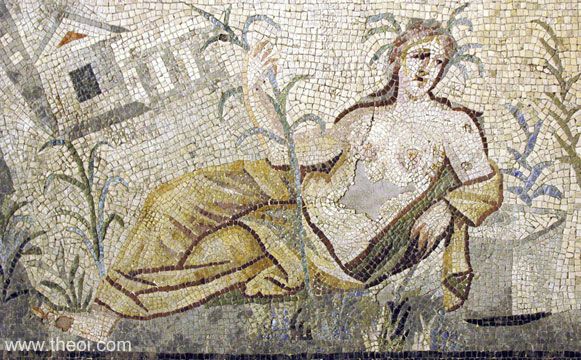
ADMETE An Okeanis whose name means "the unbroken" or "unwedded". She may have been the Naias Nymphe of a wild mountain stream, or the Nephele of wild clouds and rain. Admete was perhaps a goddess of unwedded maidens, her sister Zeuxo, representing the yoke of marriage.
AKASTE (Acaste) An Okeanis whose name means "unstable" or "irregular". She may have been the Naias Nymphe of an erratically flowing spring or stream, or a Nephele of unpredictable rainfall. Akaste might also have been a gooddess of unpredictable behavior.
AMPHIRO An Okeanis named "the surrounding flow". She may have been a Naias of a stream of Nephele of rain.
AMPHITRITE The Okeanis goddess of the sea. (She was usually numbered amongst the Nereides rather than Okeanides).
ASIA The Okeanis Nymphe of the region of Asia (or rather Anatolian peninsular). She was the wife or mother of the Titan Prometheus. Her sister was Europe.
ASTEROPE The "starry-eyed" was an Okeanis loved by Zeus.
BEROE The Okeanis Nymphe of the city of Beroe (Beruit) in Lebanon.
DAEIRA An Okeanis Nymphe named "the knowing" or "learned". She was a goddess of the town of Eleusis, perhaps the Naias of the sacred town well.
DIONE The Okeanis Nymphe "heavenly" or "divine" was a goddess of the oracle of Dodona in Thesprotia.
DODONE (Dodona) The Okeanis Nymphe of Dodona in Thesprotia. She may have been the Naias of a local spring or well, and was perhaps the same as the Okeanis Dione.
DORIS The Okeanis "pure water" was a wife of the sea-god Nereus. She may have represented the mingling of fresh-water with the brine of the sea. Alternatively she was the goddess of the Dorian-tribe of Greeks, just as her sister Ianeira presided over the Ionians.
EIDYIA (Idyia) The Okeanis "seeing" or "knowing" was the wife of King Aeetes of Kolkhis (Colchis). She was apparently a goddess connected with the power of witchcraft.
ELEKTRA (Electra) The Okeanis "amber" or "amber-coloured" was perhaps a goddess of sun-coloured clouds. She was the mother of the rainbow goddess Iris by the sea-god Thaumas (Wondrous).
EPHYRA The Okeanis Nymphe of the town of Ephyra (Korinthos). She was probably the Naias of the town's well or spring.
EUDORA The Okeanis "good-gifts" was perhaps a Nephele of good downfalls of rain or the Naias of a generously flowing spring.
EUROPE (Europa) The Okeanis Nymphe of the continent of Europe. Her sister was Asia.
EURYNOME 1 The Okeanis Nymphe of "broad-pastures". She was the mother of the Kharites (Charites) by Zeus. Eurynome was perhaps one of the Epimelides--nymphai of the pastures.
EURYNOME 2 The Okeanis Nymphe of "wide-rulership". She was the wife of the Titan Ophion.
GALAXAURA The Okeanis Nymphe "milky breeze" was probably the Aura or Nephele of the mist-clearing breeze.
HAGNO The Okeanis "holy" was one of the nurses of the infant god Zeus. She was the Naias of the Arkadian spring Hagno, whose waters generated the clouds of a Nephele.
HESIONE The Okeanis "knowing" or "foresight" was a goddess of foreknowledge. She was the wife of the Titan Prometheus (forethought). Hesione was also known as Pronoia.
HIPPO The Okeanis Nymphe "horse" was the Naias of a stream or Aura of breezes - both winds and waters were often likened to horses.
HYALE The Okeanis "crystal" or "clear like crystal" was a Nephele of rain. She was on the attendant Nymphs of Artemis.
IAKHE (Iache) The Okeanis of the ritual cry of joy "iakhe". She was a goddess of the Eleusinian Mysteries.
IANEIRA An Okeanis Nymphe, perhaps the goddess of the Ionian tribe of Greeks. Her sister Doris presided over the Dorians.
IANTHE The Okeanis of "violet flowers" or the colour "violet". She may have been a Nephele of the violet tinged clouds of dawn, or an Anthousa (flower-nymph) of violets.
KALLIRHOE (Callirhoe) The Okeanis "fair-flowing" was either the Naias of a good flowing spring or Nephele (Cloud) of good downpours. She was the mother of the Erythian (Spanish) giant Geryon.
KALYPSO (Calypso) An Okeanis whose name means "hidden", "covered"or "veiled". She may have been the Naias of a covered or hidden spring or the Aura of invisible breezes.
KAMARINA (Camarina) The Okeanis Nymphe of the city of Kamarina in Sicily. She was probably the Naias of the town fountain or well.
KAPHEIRA (Capheira) The Okeanis "storm-breath" was probably the Aura of strong winds. She was a nurse of the god Poseidon.
KERKEIS (Cerceis) One of the Okeanides.
KETO (Ceto) The Okeanis "sea-monster" was a love of the god Helios.
KHARIKLO (Chariclo) A Okeanis Nymphe of Mount Pelion in Thessalia. She was the wife of the wise kentauros Kheiron (centaur Chiron).
KHRYSEIS (Chryseis) The Okeanis "golden" or "golden-yellow" was probably either a Nephele of the golden-tinged clouds of sunset, or the Naias of a gold-producing mountain-spring.
KLYMENE 1 (Clymene) The Okeanis goddess of fame and infamy was the wife of the Titan Iapetos.
KLYMENE 2 (Clymene) The Okeanis of fame was the mother of the Phaethon by Helios the sun. She was probably one of the Nephelai. She may be the same as Klytia.
KLYTIA (Clytia) An Okeanis named "fame" or "renown" who fell in loved with the Sun-god Helios and was transformed into a sun-gazing heliotrope flower. She may have been the same as Klymene 2.
KROKALE (Crocale) The Okeanis "sea-shore" was a Naias Nymphe companion of the goddess Artemis.
LEUKE (Leuce) An Okeanis named "the white" who was loved by Haides god of the underworld. She was transformed into the white poplar tree of the blessed Elysian Fields.
LEUKIPPE (Leucippe) The Okeanis "White-Horse" was probably the Nephele or Aura of fast moving clouds, or the Naias of a frothy white spring or mountain stream. Winds and waters were often compared to horses.
LIBYA The Okeanis Nymphe of the continent of Libya (Africa). She was a sister of Europe and Asia.
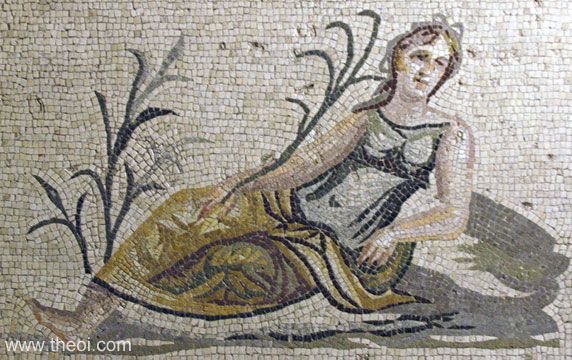
MELIA (1) The Okeanis "honey-sweet" was the wife of the Argive river-god Inakhos. She was probably the Naias of a sweet-water spring, perhaps the same as Melia 2 below.
MELIA (2) An Okeanis named "honey-sweet" who was loved by the god Apollon. She was the Naias of the Theban spring Ismene.
MELIBOIA (1) (Meliboea) The Okeanis "sweet-cattle" was the wife of the early Arkadian King Pelasgos. She was probably either the Naias nymphe of an Arkadian spring or the Epimelis of cattle-grazing pastures.
MELIBOIA (2) (Meliboea) An Okeanis loved by the Syrian River-God Orontes.
MELITE The Okeanis "honey-sweet" was probably the Nymphe of sweet-water spring.
MELOBOSIS The Okeanis "food of fruit" or "sheep-feeder" was probably one of the Epimelides, Nymphai of grassy pastures or fruit trees.
MENESTHO The Okeanis "swift-force" or "strong and fast" was probably the Naias of a full flowing stream, or the Aura of strongly blowing breezes.
MEROPE The Okeanis "with face turned" was the mother of Phaethon by the god Helios. She was probably the same as Klymene 2.
METIS The Okeanis goddess of wisdom and good-counsel. She was loved by Zeus, who swallowed her to avoid the prophecy that her son would dethrone him.
NEDA The Okeanis goddess of the Arkadian River Neda. She was an Arkadian nurse of the infant god Zeus.
NEMESIS The Okeanis goddess of indignation and retribrution for evil deeds or undeserved good fortune. She was also called a daughter of Nyx or Zeus.
NEPHELE (1) A Nymphe "cloud" who was the wife of the mortal King Athamas. She rescued her two children from sacrifice by sending a flying golden-fleeced Ram to their aide (a creature reminiscent of a golden cloud).
NEPHELE (2) A Nymphe formed by Zeus in the shape of Hera out of the clouds. She was raped by the criminal Ixion, and bore him the Kentauroi (Centaurs).
NEPHELE (3) The Okeanis Nymphe "cloud" was one of the virgin Nephelai attendants of the goddess Artemis.
NYMPHAI ARTEMIAI, THE (Nymphs of Artemis) The fifty youngest Okeanides were handmaidens of the goddess Artemis.
NYSIADES, THE Five Okeanides of the mythical Mount Nysa who nursed the god Dionysos and became the first of his Bakkhantes (Bacchantes).
OKYRHOE (Ocyrhoe) The Okeanis "swift-flowing" was either a Naias of fast flowing spring, or Nephele of falling rain.
OURANIA (Urania) The "heavenly-one" was probably an Okeanis Nephele (of the clouds).
PAREGORON The Okeanis goddess of consolation and soothing words. She was an attendant of the goddess Aphrodite.
PERIBOIA (Periboea) The Okeanis "surrounded by cattle" was the wife of the Titan Lelantos. She was probably the Naias of a pasture-feeding stream.
PASITHOE An Okeanis whose name means "all-swift". She was probably either the Naias of a fast-flowing spring or an Aura of the swift breeze.
PEITHO The Okeanis goddess of persuasion and seduction. She was a close companion of Aphrodite.
PERSEIS An Okeanis-eponym of Persia and mother by Helios of the eastern despots Aeetes and Perses, and the witches Pasiphae and Kirke. Her name also means "destroyer" who probably was a goddess of the destructive power of witches.
PETRAIE The Okeanis "of the rocks" or "stone-grey" was probably the Naias of a rocky spring, or Nephele of dark grey clouds.
PHAINO (Phaeno) The Okeanis "appearing" or "shining" was perhaps the Nephele of the appearance of cloud, or the Naias of a bright spring.
PHIALE The Okeanis "water-pitcher" was one of the companions of the goddess Artemis. She was either a spring Naias or rain-pouring Nephele.
PHILYRE (Philyra) An Okeanis who was the mother of the kentauros Kheiron (centaur Chiron) by Kronos (Cronus). She was transformed into a linden tree (philyre).
PLEIONE The Okeanis goddess of many (offspring) was the mother of the Pleiades by Atlas. She was either a Nephele of many rain-bringing clouds, or an Epimelis of the multiplying flocks of the mountain pasture.
PLEXAURE (Plexaura) The Okeanis of the "weaving breeze" was probably one of the Aurai.
PLOUTO (Pluto) The Okeanis goddess of wealth was probably a Nephele of fertile rains, prospering the agricultural crop.
POLYDORA The Okeanis "many gifts" might have been the Nephele of generous downfalls.
PRONOIA (Pronoea) The Nymphe named "foresight" was the wife of the Titan Prometheus. She was a goddess of the shrine of Delphoi, and probably the same as the Okeanis Hesione.
PRYMNO The Okeanis "root" or "undermost" was probably the Naias Nymphe of groundwater, or the waters of a deep well.
PSEKAS (Psecas) The Okeanis "rain-shower" was a Nephele companion of the goddess Artemis.
RHANIS An Okeanis named "rain-drop". She was one of the Nephelai attendants of the goddess Artemis.
RHODEIA The Okeanis named "of the roses" or "rose-coloured" was either an Anthousa flower-nymphe, Naias of a rose-draped spring, or Nephele of the rose-tinged clouds of dawn.
RHODOPE The Okeanis "rosey-eyed" was probably either an Anthousa flower-nymphe of Nephele of the rose-coloured clouds of dawn.
STYX The Okeanis goddess of the Arkadian River Styx. She was "the hated", whose dark streams symbolised poisoned waters.
TELESTO The Okeanis goddess of success and accomplishment. She was probably one of the Nephelai, an ethereal goddess.
THEIOSA An Okeanis nurse of the infant Zeus in Arkadia (Arcadia).
THOE The Okeanis "swift" might have been a Naias, Nephele or Aura Nymphe.
TYKHE (Tyche) The Okeanis goddess of fortune or chance was probably one of the heavenly Nephelai.
XANTHE The Okeanis "yellow" or "yellow-brown" was probably either a Naias of a muddy flowing stream, or the Nephele of the yellowed clouds of dawn and dusk.
ZEUXO An Okeanis named "the yoked" was probably a goddess of marriage, brides being yoked in marriage. She may have been a Naias or Nephele Nymphe, in the sense of a yoked or tamed horse.
ALTERNATE NAME SPELLINGS
Greek Name
Ωκεανιναι
Οκεανινες
Transliteration
Ôkeaninai
Ôkeanines
Latin Spelling
Oceaniae
Oceanines
Translation
Daughters of Oceanus
Daughters of Oceanus
CLASSICAL LITERATURE QUOTES
PARENTAGE & NAMES OF THE OCEANIDS
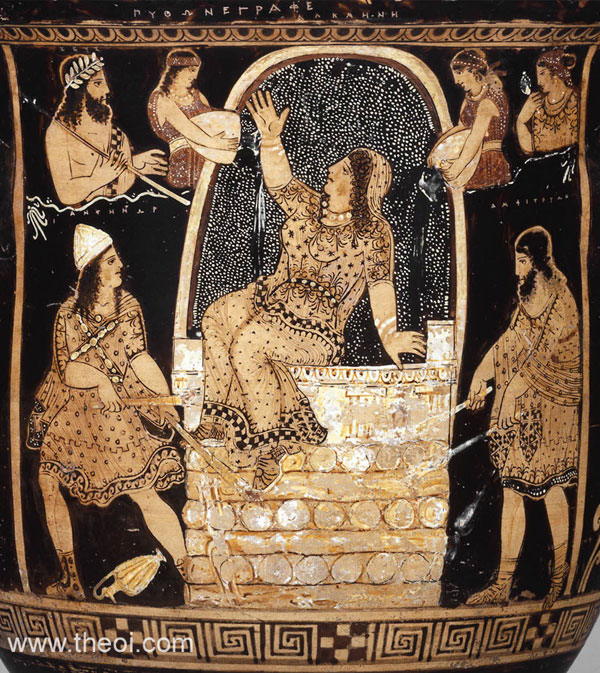
Hesiod, Theogony 346 ff (trans. Evelyn-White) (Greek epic C8th or 7th B.C.)
:
"Tethys bore to Okeanos (Oceanus) the swirling Potamoi (Rivers) . . . She [Tethys] brought forth also a
race apart of daughters [the Okeanides (Oceanids)], who with lord Apollon and the Rivers have the young in their
keeping all over the earth, since this right from Zeus is given them. They are Peitho, Admete, Ianthe and
Elektra, Doris and Prymno and Ourania like a goddess, Hippo and Klymene, Rhodeia and Kallirhoe, Zeuxo and
Klytia, and Idyia and Pasithoe, Plexaura and Galaxaura and lovely Dione, Melobosis and Thoe, and Polydora the
shapely, Kerkeis of the lovely stature, and ox-eyed Plouto, Xanthe and Akaste, Perseis and Ianeira, Petraie the
lovely, and Menestho, and Europa, Metis and Eurynome, Telesto robed in saffron, Khryseis, and Asia, and alluring
Kalypso, Eudora and Tykhe, and Amphiro and Okyroe, and Styx, who among them all has the greatest eminence.
Now these are the eldest of the daughters who were born to Tethys and Okeanos, but there are many others beside
these, for there are three thousand light-stepping daughters of Okeanos scattered far and wide, bright children
among the goddesses, and all alike look after the earth and the depths of the standing water."
Homeric Hymn 2 to Demeter 415 ff (trans. Evelyn-White) (Greek epic C7th or 6th B.C.)
:
"The deep-bosomed daughters of Okeanos (Oceanus) . . . were playing in a lovely meadow, Leukippe and Phaino
and Elektra and Ianthe, Melita also and Iakhe with Rhodea and Kallirhoe and Melobosis and Tykhe and Okyrhoe,
fair as a flower, Khryseis, Ianeira, Akaste and Admete and Rhodope and Plouto and charming Kalypso; Styx too was
there and Ourania and lovely Galaxaura."
Aeschylus, Prometheus Bound 136 ff (trans. Weir Smyth) (Greek tragedy C5th B.C.)
:
"[The Okeanides, (Oceanids)] offspring of fruitful (polyteknos) Tethys and of him who with his
sleepless current encircles the whole earth, children of your father Okeanos (Oceanus)."
Aristophanes, Clouds 264 ff (trans. O'Neill) (Greek comedy C5th to 4th B.C.)
:
"[Comedy-Play :] Come, oh! Nephelai (Clouds) [Okeanides] . . . tarrying in the gardens of Okeanos
(Oceanus), your father, forming sacred Choruses with the Nymphai (Nymphs)."
Pseudo-Apollodorus, Bibliotheca 1. 8 (trans. Aldrich) (Greek mythographer C2nd A.D.)
:
"The Titanes (Titans) had children. Those of Okeanos (Oceanus) and Tethys were called Okeanides (Oceanids)
: Asia, Styx, Elektra, Doris, Eurynome, Amphitrite, and Metis."
Pseudo-Hyginus, Preface (trans. Grant) (Roman mythographer C2nd A.D.) :
"From Oceanus and Tethys the Oceanides--namely yaea, Melite, Ianthe, Admete, Stilbo, Pasiphae, Polyxo,
Eurynome, Euagoreis, Rhodope, lyris, Clytia, teschinoeno, clitenneste, Metis, Menippe, Argia."
[N.B. Some of the names given are adjectives which Hyginus has mistaken for Oceanides.]
Virgil, Georgics 4. 334 ff (trans. Fairclough) (Roman bucolic C1st B.C.) :
"About her [Kyrene (Cyrene), a nymphe of the River Peneios (Peneus)] the Nymphae (Nymphs) were spinning
fleeces of Miletus, dyed with rich glassy hue--Drymo and Xantho, Ligea and Phyllodoce, their shining tresses
floating over snowy necks [probably four Naiads]; Nesaea and Spio, Thalia and Cymodoce [four Nereids]; Cydippe
and golden-haired Lycorias--a maiden one, the other having but felt the first birth-throes; Clio and Beroe, her
sister, daughters of Oceanus both, both arrayed in gold, and both in dappled hides [as huntresses]; Ephyre and
Opis, and Asian Deiopea, and fleet Arethusa, her arrows laid aside at last. Among these Clymene was telling of .
. . the countless loves of the gods."
[N.B. Of these nymphs Clio, Beroe and Clymene and Ephyre were Okeanides, and possibly Opis and Deiopea as well.]
HYMNS TO THE OCEANIDS
Orphic Hymn 51 to the Nymphs (trans. Taylor) (Greek hymns C3rd B.C. to 2nd A.D.)
:
"To the Nymphai (Nymphs) [Okeanides (Oceanids)], Fumigation from Aromatics. Nymphai, who from Okeanos
(Oceanus) famed derive your birth, who dwell in liquid caverns of the earth; nurses of Bakkhos (Bacchus),
secret-coursing powers, fructiferous Goddesses, who nourish flowers: earthly-rejoicing, who in meadows dwell,
and caves and dens, who depths extend to hell. Holy, oblique, who swiftly soar through air, fountains, and dews,
and winding streams your care, seen and unseen, who joy with wandering wide, and gentle course through flowery
vales to glide; with Pan exulting on the mountains' height, inspired, and stridulous, whom woods delight:
Nymphai odorous, robed in white, whose streams exhale the breeze refreshing, and the balmy gale: with goats and
pastures pleased, and beasts of prey, nurses of fruits, unconscious of decay. In cold rejoicing, and to cattle
kind, sportive, through ocean wandering unconfined. O Nysiai [Nysiades], insane (manikoi), whom oaks
delight, lovers of spring, Paionian virgins bright; with Bakkhos and with Deo [Demeter] hear my prayer, and to
mankind abundant favour bear; propitious listen to your suppliant's voice, come, and benignant in these rites
rejoice; give plenteous seasons and sufficient wealth, and pour in lasting streams, continued health."
THE OCEANIDS COMPANIONS OF PERSEPHONE
Persephone was playing in a flowery meadow with the Okeanides when Haides abducted her to the Underworld.
Homeric Hymn 2 to Demeter 5 ff (trans. Evelyn-White) (Greek epic C7th or 6th B.C.)
:
"She [Persephone] was playing with the deep-bosomed [Okeanides] daughters of Okeanos (Oceanus) and
gathering flowers over a soft meadow, roses and crocuses and beautiful violets, irises also and hyacinths and
the narcissus."
Homeric Hymn 2 to Demeter 415 ff :
"[Persephone tells Demeter of her abduction :] ‘All we were playing in a lovely meadow, [the
Okeanides (Oceanids)] Leukippe and Phaino and Elektra and Ianthe, Melita also and Iakhe with Rhodea and
Kallirhoe and Melobosis and Tykhe and Okyrhoe, fair as a flower, Khryseis, Ianeira, Akaste and Admete and
Rhodope and Plouto and charming Kalypso; Styx too was there and Ourania and lovely Galaxaura with Pallas
[Athena] who rouses battles and Artemis delighting in arrows: we were playing and gathering sweet flowers in our
hands, soft crocuses mingled with irises and hyacinths, and rose-blooms and lilies, marvellous to see, and the
narcissus which the wide earth caused to grow yellow as a crocus.’"
THE OCEANIDS COMPANIONS OF ARTEMIS
Callimachus, Hymn 3 to Artemis 12 ff (trans. Mair) (Greek poet C3rd B.C.)
:
"[Artemis addresses Zeus :] ‘And give me sixty Okeanines (daughters of Okeanos) [Oceanids] for my
choir--all nine years old, all maidens yet ungirdled.’"
Callimachus, Hymn 3 to Artemis 40 ff :
"And the maiden [Artemis] fared unto the white moutain of Krete (Crete) leafy with woods; thence unto
Okeanos (Oceanus); and she chose many Nymphai (Nymphs) [Okeanides] all nine years old, all maidens yet
ungirdled. And the River Kairatos (Caeratus) was glad exceedingly, and glad was Tethys that they were sending
their daughters to be handmaidens to the daughter of Leto."
THE OCEANIDS & PROMETHEUS
I. THE WEDDING OF PROMETHEUS
Prometheus was married to Hesione, one of the Okeanides. Her sisters sang the hymn at the wedding.
Aeschylus, Prometheus Bound 555 ff (trans. Weir Smyth) (Greek tragedy C5th B.C.)
:
" [The chorus of Okeanides (Oceanids) address Prometheus :] This song, which, about your [Prometheus']
bridal bed and bath, I raised to grace your marriage, when you wooed with gifts and won my sister [the Okeanis]
Hesione to be your wedded wife."
II. THE CHAINING OF PROMETHEUS
Okeanides formed the chorus in Aeschylus' play Prometheus Bound in which they sympathize with the plight of the chained Titan and prompt him to tell his story.
Aeschylus, Prometheus Bound 115-285 (trans. Weir Smyth) (Greek tragedy C5th B.C.)
:
"Prometheus [who has just been chained to a mountain crag] : Ha! Behold! What murmur, what scent wings to
me, its source invisible, heavenly or human, or both? Has someone come to this crag at the edge of the world to
stare at my sufferings--or with what motive? . . . What may be this rustling stir of birds I hear again nearby?
The air whirs with the light rush of wings. Whatever approaches causes me alarm.
[The Daughters of Okeanos enter on a winged car, perhaps representing the clouds.]
Chorus [of Okeanides (Oceanids)] : Do not fear! For our group has come in swift rivalry of wings to this crag as
friend to you, having won our father's consent as best we might. The swift-coursing breezes (aurai)
bore me on; for the reverberation of the clang of iron pierced the depths of our caves and drove my grave
modesty away in fright; unsandalled I have hastened in a winged car.
Prometheus : Alas! Alas! Offspring of fruitful (polyteknos) Tethys and of him who with his sleepless
current encircles the whole earth, children of your father Okeanos (Oceanus), behold, see with what fetters,
upon the summit crag of this ravine, I am to hold my unenviable watch
Chorus [of Okeanides] : I see, Prometheus; and over my eyes a mist of tears and fear spread as I saw your body
withering ignominiously upon this rock in these bonds of adamant. For there are new rulers in heaven, and Zeus
governs with lawless customs; that which was mighty before he now brings to nothing. . . . Who of the gods is so
hard of heart as to exult in this? Who does not sympathize with your woes--save only Zeus? But he in malice, has
set his soul inflexibly and keeps in subjection the race [Titanes] sprung from Ouranos (Uranus); nor will he
stop, until he has satiated his soul or another seizes his impregnable empire by some device of guile . . . You
are bold, and do not yield to your bitter pangs; you give too much license to your tongue. But my soul is
agitated by piercing fear, and I am in dread about your fate, wondering to what haven you must steer your ship
to see an end of your voyage of sorrow. For the heart of Kronos' (Cronus') son [Zeus] is hardened against
entreaty and his ways are inexorable. . . .
Chorus [of Okeanides] : Not to unwilling ears have you made this appeal, Prometheus. And so now with light foot
I will quit my swift-speeding seat and the pure air (aithêr), the pathway of birds and draw near
to this rugged ground; for I want to hear the whole story of your sorrows."
Aeschylus, Prometheus Bound 399 ff :
"Chorus [of Okeanides] : I mourn your unfortunate fate, Prometheus. Shedding from my eyes a coursing flood
of tears I wet my tender cheeks with their moist streams. For Zeus, holding this unenviable power by
self-appointed laws, displays towards the gods of old an overweening spirit. Now the whole earth cries aloud in
lamentation."
Aeschylus, Prometheus Bound 528 ff :
"[Chorus of Okeanides :] Nor may I be slow to approach the gods, with holy sacrifices of oxen slain, by the
side of the ceaseless stream of Okeanos (Oceanus), my father; and may I not offend [Zeus] in speech; but may
this rule abide in my heart and never fade away."
Aeschylus, Prometheus Bound 1054 ff :
"Hermes : Such indeed are the thoughts and the words [of Prometheus] one hears from men deranged . . . But,
at all events, may you [the Okeanides (Oceanids)] who sympathize with his anguish, withdraw in haste from this
spot so that the relentless roar of the thunder [from Zeus] does not stun your senses.
Chorus [of Okeanides] : Use some other strain and urge me to some other course in which you are likely to
convince me. This utterance in your flood of speech is, I think, past all endurance. How do you charge me to
practise baseness? With him I am content to suffer any fate; for I have learned to detest traitors, and there is
no pest I abhor more than this.
[As the thunder begins to roar, the Okeanides heed the warning and depart.]"
THE OCEANIDS & IO
In Aiskhylos' (Aeschylus') play Prometheus Bound the Okeanides--aunts of the Nymphe Io--prompt her to tell them of her trials.
Aeschylus, Prometheus Bound 631 ff (trans. Weir Smyth) (Greek tragedy C5th B.C.)
:
"Chorus [of Okeanides (Oceanides) address Prometheus and the Nymphe Io] : Let us first inquire the story of
her [Io's] affliction and let her with her own lips relate the events that brought horrid calamity upon her.
Then let her be instructed by you [Prometheus] as to the toils still to come.
Prometheus : It is for you, Io, to grant them this favor, especially since they [the Okeanides] are your
father's [Inakhos' (Inachus')] sisters. For it is worthwhile to indulge in weeping and in wailing over evil
fortunes when one is likely to win the tribute of a tear from the listener.
Io: I do not know how to refuse you. You shall learn in truthful speech all that you would like to know. Yet I
am ashamed to tell about the storm of calamity sent by Heaven, of the marring of my form, and of the source from
which it swooped upon me, wretched that I am."
Aeschylus, Prometheus Bound 894 ff :
"[Chorus of Okeanides :] Never, oh never, immortal Moirai (Fates), may you see me the partner of the bed of
Zeus, and may I be wedded to no bridegroom who descends to me from heaven. For I shudder when I behold the
loveless maidenhood of Io [niece of the Okeanides], cruelly crushed like this by her toilsome wanderings sent by
Hera."
THE OCEANIDS & HELIUS
Nonnus, Dionysiaca 38. 108 ff (trans. Rouse) (Greek epic C5th A.D.) :
"Loudbooming Okeanos (Oceanus), girdled with the circle of the sky, who leads his water earth-encompassing
round the turning point which he bathes, was joined in primeval wedlock with Tethys. The water bride-groom begat
Klymene (Clymene), fairest of the Neiades [Okeanides (Oceanids)], whom Tethys nursed on her wet breast, her
youngest, a maiden with lovely arms . . . Her father united the girl to the heavenly charioteer. The lightfoot
Horai (Horae, Seasons) acclaimed Klymene's bridal with Helios (the Sun) Phaesphoros (Lightbringer), the Nymphai
Neides (Naiad Nymphs) [i.e. Okeanides] danced around; in a watery bridal-bower the fruitful maiden was wedded in
a flaming union, and received the hot bridegroom into her cool arms . . .
As he [Phaethon son of Helios and Klymene] sprang from the childbed, the daughters of Okeanos cleansed him,
Klymene's son, in his grandsire's waters, and wrapt him in swaddlings."
NAMES OF THE OCEANIDS
Greek Name
Πειθω
Αδμητη
Ιανθη
Ηλεκτρη
Transliteration
Peithô
Admêtê
Ianthê
Êlektrê
Latin Spelling
Peitho
Admete
Ianthe
Electra
Translation
Persuasion (peithô)
Unbroken, Unwed (admêtos)
Heat (ianthên), Violet (ianthos)
Amber, Amber-colour (êlektros)
Greek Name
Πρυμνω
Ουρανιη
Ἱππω
Δωρις
Transliteration
Prymnô
Ouraniê
Hippô
Dôris
Latin Spelling
Prymno
Urania
Hippo
Doris
Translation
Undermost, Root (prymnos)
Heavenly (ouranos)
Horse (hippos)
Gift, Present (dôros), Pure Water (zôros)
Greek Name
Κλυμενη
Ροδεια
Καλλιροη
Ζευξω
Transliteration
Klymenê
Rhodeia
Kallirhoê
Zeuxô
Latin Spelling
Clymene
Rhodia
Callirhoe
Zeuxo
Translation
Fame, Infamy (klymenos)
Rose, Rose-Colour (rhodon)
Beautiful-Flow (kalli-, rhoos)
Yoked (zeuxis, zeugos)
Greek Name
Κλυτιη
Ιδυια
Πασιθοη
Πληξαυρη
Transliteration
Klytiê
Idyia
Pasithoê
Plêxaurê
Latin Spelling
Clytia
Idyia
Pasithoe
Plexaura
Translation
Renowned, Glorious (klytos)
Seeing, Knowing (eidô)
All-Swift (pasi, thoos)
Weaving-Breeze (plekô, aurê)
Greek Name
Γαλαξαυρη
Διωνη
Μηλοβοσις
Φοη
Transliteration
Galaxaurê
Diônê
Mêlobosis
Phoê
Latin Spelling
Galaxaura
Dione
Melobosis
Phoe
Translation
Milky-Breeze (galaktos, aurê)
Heavenly, Divine (dios)
Feeder-of-Sheep (bosis, mêlon)
Light, Day (phoôs)
Greek Name
Πολυδωρη
Κερκηις
Πλουτω
Περσηις
Transliteration
Polydôrê
Kerkêis
Ploutô
Persêis
Latin Spelling
Polydora
Cerceis
Pluto
Perse
Translation
Many-Gifts (poly, dôros)
Of the Weaving Shuttle (kerkis)
Wealth (ploutos)
Destroyer, Ravager (persô, perthô)
Greek Name
Ιανειρα
Ακαστη
Ξανθη
Πετραιη
Transliteration
Ianeira
Akastê
Xanthê
Petraiê
Latin Spelling
Ianira
Acaste
Xanthe
Petraea
Translation
Of the Ionians?
Unstable, Irregular (akastatos)
Yellow, Blonde (xanthos)
Of the Rocks, Stone-Grey (petraios)
Greek Name
Μενεσθω
Ευρωπη
Μητις
Ευρυνομη
Transliteration
Menesthô
Eurôpê
Mêtis
Eurynomê
Latin Spelling
Menestho
Europa
Metis
Eurynome
Translation
Swift-Force (thoos, menos)
Wide-Eyed, Of Europe (eur, ops)
Counsel, Plan, Devise (metis)
Broad-Pasture, Wide-Ruling (eury, nomos)
Greek Name
Τελεστω
Χρυσηις
Ασιη
Καλυψω
Transliteration
Telestô
Khrysêis
Asiê
Kalypsô
Latin Spelling
Telesto
Chryseis
Asia
Calypso
Translation
Accomplish, Success (telestos, teleeiô)
Golden, Golden-Yellow (khryseos)
Of Asia (Asiê)
Covered, Veiled, Hidden (kalyptô)
Greek Name
Ευδωρη
Τυχη
Αμφιρω
Ωκυροη
Transliteration
Eudôrê
Tykhê
Amphirô
Ôkyrhoê
Latin Spelling
Eudora
Tyche
Amphiro
Ocyrhoe
Translation
Good-Gifts (eu, dôros)
Chance, Fortune (tykhê)
Surrounding-Flow (amphi, rhoos)
Fast-Flowing (ôkus, rhoos)
Greek Name
Στυξ
Λευκιππη
Φαινω
Ιαχη
Ροδοπη
Transliteration
Styx
Leukippê
Phainô
Iakhê
Rhodopê
Latin Spelling
Styx
Leucippe
Phaeno
Iache
Rhodope
Translation
Hatred, Gloom (stygos)
White-Horse (leukos, hippos)
Appear, Reveal, Shine (phainô)
Shout, Cry of Joy (iakhê)
Rose-Faced (rhodos, ops)
ANCIENT GREEK & ROMAN ART
SOURCES
GREEK
- Hesiod, Theogony - Greek Epic C8th - 7th B.C.
- The Homeric Hymns - Greek Epic C8th - 4th B.C.
- Aeschylus, Prometheus Bound - Greek Tragedy C5th B.C.
- Aristophanes, Clouds - Greek Comedy C5th - 4th B.C.
- Apollodorus, The Library - Greek Mythography C2nd A.D.
- Callimachus, Hymns - Greek Poetry C3rd B.C.
- The Orphic Hymns - Greek Hymns C3rd B.C. - C2nd A.D.
- Nonnus, Dionysiaca - Greek Epic C5th A.D.
ROMAN
- Hyginus, Fabulae - Latin Mythography C2nd A.D.
- Virgil, Georgics - Latin Bucolic C1st B.C.
OTHER SOURCES
Other references not currently quoted here: Nonnos Dionysiaca 26.355 & 41.153 & 48.246.
BIBLIOGRAPHY
A complete bibliography of the translations quoted on this page.
